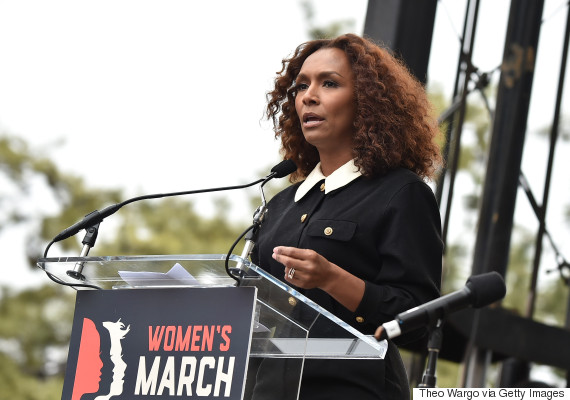Sex educator Ericka Hart is no stranger to the spotlight.
The breast-cancer survivor, who identifies as queer, made headlines last year after she went to music festival Afropunk fully topless, proudly showing off her double mastectomy scars, to increase visibility for black women with the disease. So it comes as no surprise that Hart was front and centre for the Women's March, which took place in major cities across the globe this past Saturday.
Attending the protest in Philadelphia, the 30-year-old took to the stage — with her warrior scars once again confidently in full display — to argue the importance of inclusivity in feminism moving forward. And made no qualms about calling out those who have long overlooked the trials of marginalized cis and trans women of colour.
Many women attending the marches wore pink "pussy hats" in solidarity against President Trump's 2005 remarks on grabbing women "by the pussy." However, Hart doesn't necessarily view the accessory as progressive.
"Who is this for?" she asked, referring to the march itself. "Black cis and trans women, femmes and non-binary individuals have been under attack against gross misogynoir, violence, and body terrorism. We see it everyday, even at this march."
"If you want to talk about pussy, then you must start with the black pussy."
"The trauma of the pussy did not begin with Trump, it began when such a high premium was put on the power of the white one ... If this march was for all women it would look a lot different and would have happened well before the day after the inauguration."
Hart also spoke on the lack of conversations around indigenous and disabled women, as well as sex workers.
Watch her full speech above.
Trans activist and author Janet Mock spoke at the march in Washington on Saturday, sharing similar sentiments to those of Hart's.
![janet mock]()
"Our approach to freedom need not be identical, but it must be intersectional and inclusive," she said. "It must extend beyond ourselves. I know with surpassing certainty that my liberation is directly linked to the liberation of the undocumented trans Latina yearning for refuge. The disabled student seeking unequivocal access. The sex worker fighting to make her living safely."
Several Twitter users also agreed, taking to the social media platform over the weekend to call out white feminism and push for more inclusivity in the future.
In Canada, Black Lives Matter Vancouver, who protests against systemic racialized and gender-based violence, released a statement Friday saying they were excluded from their local Women's March — proving that lack of inclusion in the march was a problem globally.
The breast-cancer survivor, who identifies as queer, made headlines last year after she went to music festival Afropunk fully topless, proudly showing off her double mastectomy scars, to increase visibility for black women with the disease. So it comes as no surprise that Hart was front and centre for the Women's March, which took place in major cities across the globe this past Saturday.
Attending the protest in Philadelphia, the 30-year-old took to the stage — with her warrior scars once again confidently in full display — to argue the importance of inclusivity in feminism moving forward. And made no qualms about calling out those who have long overlooked the trials of marginalized cis and trans women of colour.
"Not everyone who identifies as a woman has a pussy, nor does your identity as a woman have anything to do with pussy," Hart said.
Many women attending the marches wore pink "pussy hats" in solidarity against President Trump's 2005 remarks on grabbing women "by the pussy." However, Hart doesn't necessarily view the accessory as progressive.
"Who is this for?" she asked, referring to the march itself. "Black cis and trans women, femmes and non-binary individuals have been under attack against gross misogynoir, violence, and body terrorism. We see it everyday, even at this march."
"If you want to talk about pussy, then you must start with the black pussy."
"The trauma of the pussy did not begin with Trump, it began when such a high premium was put on the power of the white one ... If this march was for all women it would look a lot different and would have happened well before the day after the inauguration."
Hart also spoke on the lack of conversations around indigenous and disabled women, as well as sex workers.
Watch her full speech above.
Trans activist and author Janet Mock spoke at the march in Washington on Saturday, sharing similar sentiments to those of Hart's.

"Our approach to freedom need not be identical, but it must be intersectional and inclusive," she said. "It must extend beyond ourselves. I know with surpassing certainty that my liberation is directly linked to the liberation of the undocumented trans Latina yearning for refuge. The disabled student seeking unequivocal access. The sex worker fighting to make her living safely."
Several Twitter users also agreed, taking to the social media platform over the weekend to call out white feminism and push for more inclusivity in the future.
the future is not just female— the future is trans-inclusive, the future is non-binary, the future is intersectional #WomensMarch
— Caroline Conrad (@CPConrad) January 23, 2017
It was inspiring, powerful. But white feminism was on full display at #WomensMarch. Feminism HAS to become inclusivehttps://t.co/JI5tapbH8J
— Francesca Ebel (@FrancescaEbel) January 23, 2017
But that doesn't mean I fully supported the #WomensMarch, because I felt it wasn't fully inclusive of ALL women. -G
— Matthew Galvin (@Galvin4America) January 22, 2017
In Canada, Black Lives Matter Vancouver, who protests against systemic racialized and gender-based violence, released a statement Friday saying they were excluded from their local Women's March — proving that lack of inclusion in the march was a problem globally.
-- This feed and its contents are the property of The Huffington Post, and use is subject to our terms. It may be used for personal consumption, but may not be distributed on a website.